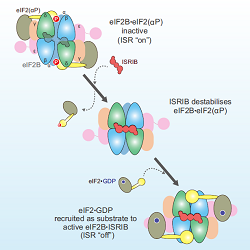
The Integrated Stress Response (ISR) is a protective mechanism used by cells when they detect adverse conditions. However, prolonged activation of the ISR can occur in, and contribute to some disease states. Dampening the ISR is therefore a potential treatment strategy for such conditions. ISRIB, is an experimental tool compound that does this, and a new paper from the Ron lab at CIMR and the Ito lab at RIKEN, Japan sheds new light on its mechanism of action. Publishing in Molecular Cell, Alisa Zyryanova, Kazuhiro Kashiwagi and colleagues demonstrate that ISRIB binds a protein called eIF2B, affecting its interactions with active and inactive forms of its target, eIF2, thereby attenuating the ISR.

